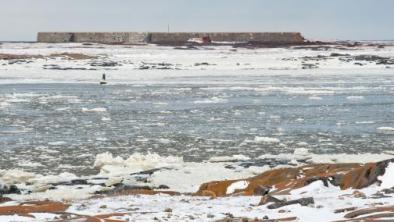Deal struck to protect woodland caribou
Lac du Bonnet Leader

North Eastman's woodland caribou aren't out of the woods just yet, no pun intended.
A deal struck on Tuesday between Canada's forestry companies and environmental groups to protect the endangered species isn't the final solution to the problem, says Eric Reder of Winnipeg's The Wilderness Committee.
"The working relationship between logging corporations and environmental groups is welcome," Reder said. "However, we're being mislead right from this very first announcement... Canadians have little reason to celebrate yet, but hopefully real work will result from this."
The deal, which comes after years of negotiation, was announced Tuesday in Toronto by the Forest Products Association of Canada (FPAC) and nine environmental groups.
It will see logging in 29 million hectares of boreal forest suspended so a plan to preserve the woodland caribou can be developed.
Reder said the announcement of 29 million hectares of protected forest is misleading because closer examination of a map published Tuesday by FPAC reveals that the majority of the area labelled as protected is actually strewn with logging cut blocks.
The 29 million hectares is the area surrounding logging cut blocks that was not going to be logged anyway, Reder said. Very few areas that were already planned for logging in the next three years have actually been deferred.
Areas of caribou habitat, at least in Manitoba, are still going to be logged in the next three years, according to the newly-released map.
As part of the deal, the environmental groups have agreed to stop their "Do Not Buy" campaigns for the time being. Many environmental groups boycotted Canadian-produced paper in reaction to what they said was irresponsible logging, which led to decimation of the caribou's habitat.
Reder said with today's announcement, forestry companies are acknowledging they have not been ecologically responsible in managing Canada's public forests, and they are committing to change.
"Canadians want ecologically sustainable management of our public forests, and we'll keep working to ensure that's what we get."
Two years ago, prior to the shutdown of Powerview-Pine Falls paper mill, Tembec Industries and the Canadian Parks and Wilderness Society negotiated a 50-year halt to logging in woodland caribou habitat in North Eastman.
The logging hiatus ensures protection for the Owl Lake woodland caribou herd, which is located northeast of Lac du Bonnet.
Several years ago, the woodland caribou were declared a threatened species by the Committee on the Status of Endangered Wildlife in Canada. There are less than 90 caribou in the Owl Lake herd.
Dr. Brian Kotak, general manager of Manitoba Model Forest in Powerview-Pine Falls has studied the animals extensively.
"Several years ago, a new (group) called the Canadian Boreal Initiative was formed, which included these groups (including Tembec's corporate office in Temiscaming). Things had been pretty quiet for the last couple of years, until yesterday. I was not aware that a 'deal' had been reached. This was news to me, as well as the amount of land involved," he said.
"The concept is an interesting one. Somewhere along the line there must be a balance between economic interests and protecting the boreal forest and important species such as caribou. Sometimes you can have both at the same time. However, protected areas are also an important way to manage the landscape."
What does surprise him is the fact there's about 10 million hectares of land in Manitoba that falls under this agreement. By far, the largest chunk is in northwest Manitoba, in the forest management license area of Tolko.
"I find it interesting that Tembec has agreed to essentially shutting down logging and road building completely in eastern Manitoba, and at the same time, leaving the province," Kotak said. "While that area is still technically under their management until a new buyer is found for the mill in Pine Falls, what investor in their right mind would buy a mill and take over a forest management area where they are not allowed to log or build logging roads for at least two years? To me, this just doesn't add up."
One other thing that is curious, Kotak said, is that the agreement states "an early component... is the suspension of logging on nearly 29 million hectares of boreal forest, representing virtually all boreal caribou habitat within company tenures, to allow for intensive caribou protection planning while maintaining essential fibre supply for uninterrupted mill operations."
"If there is a suspension on logging in these areas, how can they also say that mill operations will not be interrupted?" Kotak said. "If the Pine Falls mill was still running, the logging suspension would make their entire wood supply area north of the Winnipeg River off limits for three years."

